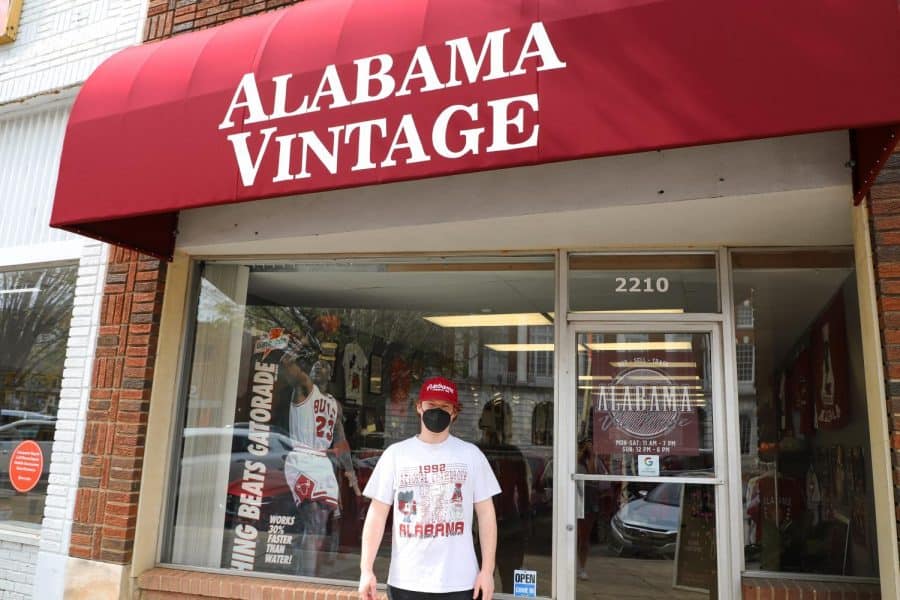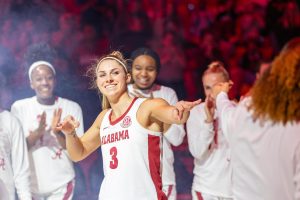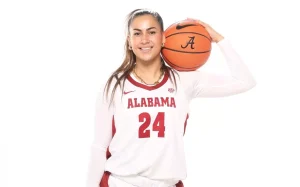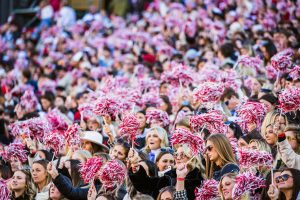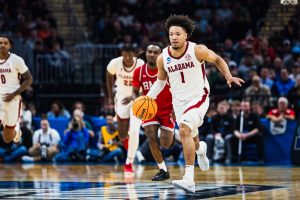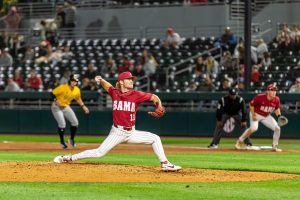How one fan apparel store is adding a one-of-a-kind twist to Alabama merch
Created by UA alum Charlie Nelson, Alabama Vintage boasts curated goods with an environmentally-friendly outlook.
March 31, 2021
In 2014, in an empty room in The University of Alabama’s Phi Gamma Delta fraternity house, fraternity brothers sifted through carefully laid-out clothing, smiling as they came across their perfect vintage find. While some may think that the clothes had been brought in by an outside business, the mastermind behind the small pop-up shop was UA finance major and Phi Gam, Charlie Nelson.
Nelson started thrifting in middle school, mostly because he wanted unique and affordable clothes to set his style apart from others. However, he also loved the thrill of shopping, which eventually led to him selling to friends and on websites for most of his teenage years.
After graduating in 2018 and working for investment management company Merrill Lynch for two years, Nelson would finally realize that he wanted to open his own vintage clothing business.
He quit his highly successful job and moved back home to Huntsville in a bid to finally make his dreams a reality. He successfully opened Huntsville Vintage in 2020, and then the entrepreneur set his sights on his old stomping ground, Tuscaloosa.
After several successful pop-up shops throughout campus and Tuscaloosa, Nelson happily announced the opening of his second brick-and-mortar store, Alabama Vintage. Nestled in the heart of Downtown Tuscaloosa, Alabama Vintage opened this January, selling hundreds of unique University of Alabama Crimson Tide vintage clothing and collectibles.
Although he said it’s been difficult to navigate two stores, Nelson loves being able to bring sustainable and special Crimson Tide pieces to UA students. From vintage Crimson Tide jerseys to hats and sweatshirts, his store has a wide variety of clothing for customers to choose from.
When Nelson started thrifting in middle and high school, he recognized the growing demand for pieces that couldn’t be found in generic stores.
“Everyone used to wear those polos and those generic clothing and I didn’t really want to wear that,” Nelson said. “I liked having my own unique style so that’s when I started thrifting with my buddies. When I got to college, I noticed everyone was trying to find my stuff so I was like, ‘Well, I’ve got a closet full of it, I might as well start,’ and that’s how I got started.”
Nelson started selling to more people than just his friends by using Instagram and popular reselling apps like Mercari.
He said his online presence helped him greatly during the COVID-19 pandemic, which forced him to rely heavily on online sales. Despite this, Alabama Vintage has garnered a lot of attention since it opened.
Eleni Petruska, a senior majoring in public relations, and her friend were among the first two people in line on Alabama Vintage’s opening day. Although she didn’t know much about the store, she said she’s always looking for clothing that no one else has, especially if it is affordable and sustainable.
“I think it’s really cool that these clothes have that old charm to them and knowing that you’re gonna have something that not everyone else has,” Petruska said.
Petruska has bought several items of clothing from Alabama Vintage, but her favorites are a couple of Crimson Tide bomber jackets from the early 1990s.
“You come in here and every article of clothing is different,” Nelson said. “It helps you be unique with your own style. Whereas, if you get something from the Supe Store, you could walk down the street and see every member of the family wearing the same thing. Here, you’ll have people turning around when they walk past you just to see what you’re wearing and you’re helping the environment while doing it by reducing your carbon footprint.”
Vintage clothing is often touted for its ability to last much longer than the clothes manufactured today because it’s better able to withstand everyday wear and tear. However, many experts warn that actual vintage clothing is hard to distinguish from copycats. At Alabama Vintage, all clothing is carefully inspected and cleaned by Nelson himself.
Although Nelson opened Alabama Vintage to sell Crimson Tide gear, he said he’s hoping to expand to other vintage clothing as well. In fact, he recently learned to sew so that he can breathe new life into old clothes and stop them from going to landfills.
Nelson finds clothing from around the country to bring into his store. From sifting through thrift-shop racks to his growing network of other vintage clothing sellers, Alabama Vintage’s unique pieces are always Nelson-approved. In fact, customers can sell vintage clothes directly to him for money.
Jessica Styres, a sophomore communications major, is currently one of Nelson’s only paid employees. She got the job by introducing herself to Nelson during one of his pop-up shops in Downtown Tuscaloosa and has been working with him ever since.
For Styres, Alabama Vintage’s commitment to being environmentally friendly and ethically sourced is why she loves her job.
She said she’s learned a lot while working for Nelson, especially about small businesses.
“He chose this path because it’s what he loves,” Styres said. “He’s just honestly super passionate about it. He taught me pretty much everything I know about how old some caps are or what to look for on the tags of hats. He told me all of that stuff and not in a way that your boss sits you down and has an instruction manual. We’ve just chatted through it.”
Styres said she loves being able to work for a small local business, particularly one that is ethically sourced and environmentally friendly while still providing memorable pieces.
“I see these quotes on Pinterest that say when you buy from a small business, you’re actually putting a smile on a real person’s face,” Styre said. “I think that’s definitely true because, with Charlie, he gets so hyped. If somebody comes in the store and buys an item that he loves, he’ll sit there and tell you why he loves it. Buying from us directly profits the community, and Charlie cares a lot about the community.”
This story was corrected to reflect that Nelson was a finance major, not a biochemistry major.



